| Article ID | Journal | Published Year | Pages | File Type |
|---|---|---|---|---|
| 8843527 | Food Microbiology | 2018 | 31 Pages |
Abstract
Plant defensins are small, cysteine-rich antimicrobial peptides of the immune system found in several organs during plant development. A synthetic peptide, KT43C, a linear analogue of the native Cp-thionin II found in cowpea seeds, was evaluated for its antifungal potential. It was found that KT43C displayed antifungal activity against Fusarium culmorum, Penicillium expansum and Aspergillus niger. Like native plant defensins, KT43C showed thermostability up to 100â¯Â°C and cation sensitivity. The synthetic peptide decreased the fungal growth without inducing morphogenic changes in the fungal hyphae. Non-inhibitory concentrations of the peptide induced permeabilization of the fungal membrane. In addition, high concentrations of KT43C induced the production of reactive oxygen species in the granulated cytoplasm. To investigate potential applications, the peptide was used as an additive in the preparation of dough which did not contain yeast. This peptide delayed the development of fungal growth in the dough by 2 days. Furthermore, KT43C did not induce red blood cell lysis up to a concentration of 200â¯Î¼g.mlâ1. These results highlight the potential for the use of synthetic antimicrobial defensins for shelf-life extension of food products.
Keywords
Related Topics
Life Sciences
Agricultural and Biological Sciences
Food Science
Authors
Thibaut Thery, Elke K. Arendt,
